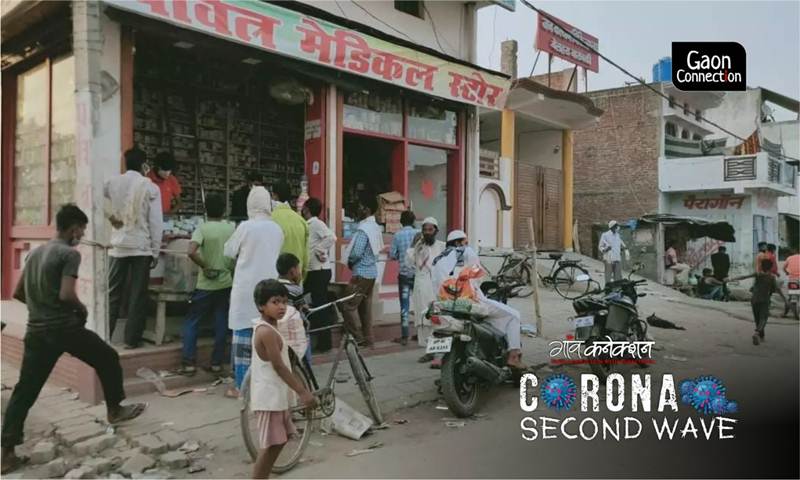At Palaana village in Rajasthan’s Bikaner district, ‘Corona’ was something others got. Few people manifested COVID19-like symptoms and so, people paid little heed to the pandemic.
Two weeks ago, that changed. “Five or six cases were detected and the government sent a van to test the villagers for the infection. Eighty people tested positive. Then on, people have begun taking Corona seriously,” 38-year-old Ashuram Godara, a resident of the village, told Gaon Connection.
Godara tested positive, and isolated himself at home. His village has a population of about 4,000 people.
What does he think caused the sudden rise in COVID19 cases in his village? “About two weeks ago, two baraats [marriage processions] arrived at the village. On April 23 and 24, we had dust storms and rain. People began coughing. Initially, we thought it was a seasonal infection. Then the symptoms intensified and people got tested, it was revealed it was Corona,” Godara added.
80 people tested positive.
Also Read: A tweet opens a Pandora’s box of how rural India is coping with the COVID19 second wave
To know how badly a village has been affected, one must visit the medical shop. It bears testimony to the COVID19 situation in villages. These medical stores are overcrowded and there is an acute shortage of even basic medicines such as paracetamol, Vitamin C tablets and cough syrup.
Also Read: Fear of testing positive is making villagers in Madhya Pradesh avoid visit to COVID test centres
In Suratganj town in Barabanki district of Uttar Pradesh, Amit Kumar, a medical store manager, told Gaon Connection that almost hundred people visit the store every day asking for medicines for body ache and fever. “The number of such customers are way more than last year,” he said.
But these medicine stores are often the only medical support that the villagers can tap into.
In Barabanki’s Berui village, Jwala Singh and Vimla Devi, the parents of middle-aged Anoop Kumar Singh, passed away within 12 hours of the other. They were not tested for COVID19 but manifested the symptoms.
“The tests couldn’t be done, but the symptoms were there. Amma was in Lucknow, you know the terrible Corona situation there. She fell sick and asked me to bring her back home to the e village. We arranged for a doctor and oxygen too, but the virus had overpowered her by then,” Anoop told Gaon Connection.
“My parents had each other’s company before their end. Amma died on April 26 at 3 am, and my father on April 27. 7. He must have contracted the infection while looking after my mother. We took precautions, wore masks, and got the house sanitised, but my father still got infected. We got the doctor, but people mostly depend on the local medical store for their treatment,” he added.
Also Read: ASHAs brave the second wave of COVID19. Without masks, sanitisers and rightful remuneration
“Presently, we have two hundred active cases. A total of ninety two gram panchayats fall under the ambit of this health centre. If we test all the villages, almost half of the people would test positive,” AK Verma, the in-charge of community health centre in Barabanki’s Fatehpur, told Gaon Connection.
Gaus Sheikh, a native of Maharashtra’s Latur, told Gaon Connection that compared to last year, the situation is very scary now. Sheikh performs the last rites of the dead in a stretch covering 50 kilometres.
“In the villages in my area, somebody or the other is sick in almost every household. In the last one-and-a-half-months, I have overseen the funerals of more than one hundred and fifty two people in Udgir taluka. At least fifty of these deaths were from the villages,” Sheikh told Gaon Connection.
Ravi Duggal, a health activist working with the Janswasthya Abhiyan, told Gaon Connection that although births are recorded, the deaths of persons are hardly reported officially.
“Barring the states in the North East, Kerala and Maharashtra, no state records the deaths of individuals efficiently, especially in the rural areas,” Duggal claimed.
“Secondly, although cases of Coronavirus have reduced in Pune and Mumbai, rural Maharashtra is witnessing a surge and there are hardly any facilities to contain its spread,” he added.
India reported 382,000 COVID19 cases in the last 24 hours ending 9 am on May 5. Of these, Maharashtra recorded 51,880 cases, while Karnataka reported 44,631. The active cases in the country presently exceed 3,487,000.


















